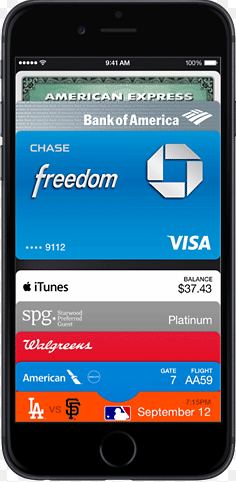 Apple Pay is the new service provided by the tech titan, which allows consumers to use either a card attached to their iTunes account or upload a new credit card number. From there, the consumer merely needs to hold their iPhone 6 or iPhone 6 Plus up to a unique scanner at the check-out line, deploying their fingerprint as confirmation of the transaction; the program is also available on the recently announced iPad Air 2 and iPad Mini 3. The transaction will be complete within moments; no credit, debit or cash necessary. Each transaction creates a unique sixteen-digit security code. If this number is interrupted, the fact that it is a one-time only code prohibits the purchase, card or device from being hacked; no other device or person can use the code again, as a means of hacking valuable information.
Apple Pay is the new service provided by the tech titan, which allows consumers to use either a card attached to their iTunes account or upload a new credit card number. From there, the consumer merely needs to hold their iPhone 6 or iPhone 6 Plus up to a unique scanner at the check-out line, deploying their fingerprint as confirmation of the transaction; the program is also available on the recently announced iPad Air 2 and iPad Mini 3. The transaction will be complete within moments; no credit, debit or cash necessary. Each transaction creates a unique sixteen-digit security code. If this number is interrupted, the fact that it is a one-time only code prohibits the purchase, card or device from being hacked; no other device or person can use the code again, as a means of hacking valuable information.
As interesting as the process sounds to be, a debate has begun as to how popular the program will be, according to an article recently completed by NBC News. Eddy Cue, apple’s senior vice president of Internet software and services, is very optimistic that many consumers and merchants will want to employ the program. It allows consumers to not have to carry cards or cash with them. In addition, it has several extra layers of security added that are not provided through use of cards, namely the sixteen digit security code and the fingerprint confirmation. However, those who oppose the idea disclaimed a concern of their purchases being tracked, ending in an invasion of privacy. Cue declared that that would certainly not be the case; he stated that Apple would not be collecting data on purchases.
But there are other challenges posed to the program. For a merchant to allow consumers to use Apple Pay, the organization must install a special scanner, entitled the NFC reader. This allows the device to be read and for the transaction to commence. Currently, less than ten percent of merchants have installed the necessary reader. In general, analysts believe that tech-savvy consumers will jump on the program, but the everyday consumer will remain hesitant. It is simply ingrained in individuals to use credit and debit cards. As this program is already very simple, it may be difficult to convince the public to switch.
Cue, on the other hand, remains unworried. Apple Pay, to him, is far faster and safer than the current methods of mobile payment. This indicates to him that it will be more popular than analysts currently predict, amongst both consumers and merchants.